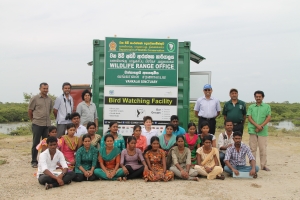Youths unite for sustainable tourism in Sri Lanka
Location: Sri Lanka . 27th Dec 2017
Nishanthan Sobana and her husband are a young couple from Sri Lanka’s Mannar District who finished school in the crippled economy of the war-torn Northern Province. Even with her Bachelor's degree in Business Management, Nishanthan initially found it challenging to find a permanent job with a stable income and – like so many people her age – was completely dependent on her parents.
Mannar is one of the districts in Northern Sri Lanka severely affected by the civil war. The escalation of conflicts in 2008 compelled people to flee, leaving many homeless and without livelihoods.
The war finally ended in early 2009 after three decades and communities were faced with the challenge of rebuilding their lives. The damaged infrastructure and economy in the Northern Province made it difficult to reconstruct homes and find employment. Affected communities seeking faster solutions to generate income began overexploiting natural resources, cutting down mangroves and using dynamite and illegal gear to fish.
In response, a local NGO called Green Movement Sri Lanka, supported by IUCN’s MFF initiative, introduced a community-based conservation model to conserve the Vedithalaitive and Vankalai coastal wetlands in Mannar district. The project aimed to build the capacity of young adults, like Nishanthan and her husband, to diversify their livelihood options, and to facilitate and boost sustainable tourism activities in the wetlands.
Sobana second from left, taking part at the Tourism guide training programme conducted by MFF for 25 youths – photo credit GMSL ( Green Movement Sri Lanka )
Implemented in collaboration with the Sri Lanka Tourism Development Authority, the project introduced a tour guide training programme. Participants were trained in English and Sinhalese language skills, hospitality management, first aid, preparation of local food, snorkeling, bird watching and boat operation. They also learned about the environmental and archaeological value of the area.
As a result of the project, project participants created the Vedithalathive Wetland Ecosystem Youth Society and registered it as a business entity. The society is now fully operational and is actively conducting sustainable tourism activities in the Vedithalaithive Nature Reserve and Vankalai Bird Sanctuary.
Leveraging the efforts of this MFF-funded project, the youth society was further trained in sustainable tourism by the World Bank and UNDP, who also provided boats and safety jackets to members of the society. In addition, 80% of those who were trained under the MFF project received further training from the Northern Provincial Council on Tourism Promotional Activities.

Attending field exercise during the tourism guide training – photo credit GMSL
Today, Nishanthan works as an Assistant Coordinator at the Gulf of Mannar Dugong and Sea Grass Conservation Project in Vidithaliative; her husband is a tour guide in Vidithaliative, earning US$ 150 per month. “Wildlife officers selected me for this job partly because of the exposure I got from the training programme,” explained Nishanthan, who is also the secretary of the Vidithaliative Wetland Ecosystem Youth Society.
The training and equipment Nishanthan received through MFF helped Nishanthan and many others conduct their own tours for local and foreign visitors to Vankalai Bird Sanctuary and Vidithaliative's mangrove forests and coral reefs. “The Sinhalese language skills we gained from the training helped us to communicate effectively with local tourists coming from South and now we are all friends,” Nishanthan reflects.
She also explained that, “due to cultural and gender barriers, there are fewer job opportunities for educated women like [her]. So this programme was a good opportunity for young, unemployed local women, who suffered for many years due to the war, to learn new skills and develop existing ones.”
During her free time, Nishanthan joins her husband to conduct snorkelling and bird-watching tours in Vedithalative, for which they charge US$ 40 per session. “With my monthly salary of US$ 200 we are now living comfortably with our seven-month-old. We no longer have to depend on our parents and nowwe are actually supporting them, paying for their living costs and medical expenses.” Of the 25 people trained by Green Movement Sri Lanka, 10 are now full-time tour guides and the rest, like Nishanthan, work seasonally.

Youth team at the Wildlife range office - Sobana sitting thi ... , Vankalai © Kumudini Ekaratne